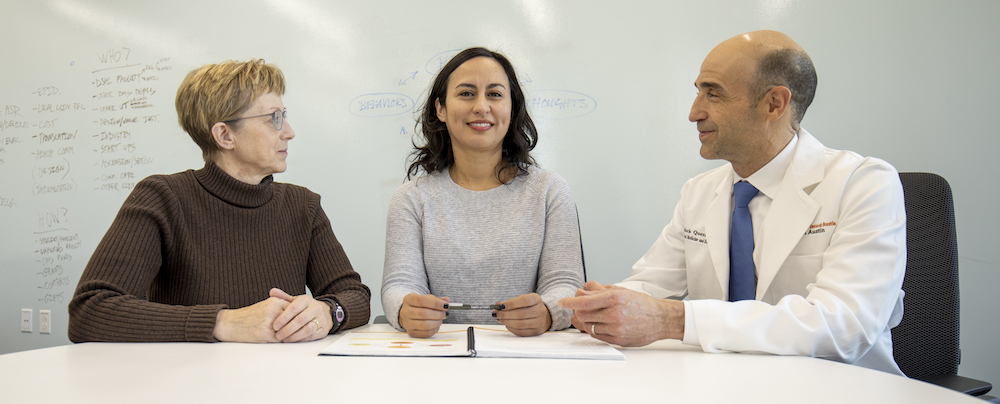“Build a workforce to integrate social care into health delivery.”
That’s one of the top directives in a recent report from the National Academies of Sciences, Engineering and Medicine. And, after 18 months of gathering evidence on how to incorporate social determinants of health into care delivery, the committee concluded that social work sets the foundation for improving the health of the whole person.
Enter the Department of Health Social Work at Dell Medical School at The University of Texas at Austin, established in 2019 as the first of its kind. A collaboration with the Steve Hicks School of Social Work, the department creates an academic home for social workers at Dell Med and builds on interprofessional training that places social work students side-by-side with medical, nursing and pharmacy students.
“Interprofessional health training has been a focus of Dell Med since it opened,” says Barbara Jones, social work professor and the department’s inaugural chair. “It started with the course Foundations of Interprofessional Collaborative Practice, which brings together faculty and students from the health professional schools at UT Austin to work and learn together.”
The structure of the department reflects the need for social work to be a building block of interprofessional health teams. Licensed social workers embedded in teams across the Dell Med enterprise—as clinical social workers, researchers, administrative directors and program managers—are all members of the department as well as of their own individual units. They also qualify for faculty appointments at the Steve Hicks School.
Care for mind and body
Before she arrived at Dell Med’s Musculoskeletal Institute, Cynthia Corral had gained experience as a medical social worker in Austin’s major care providers for both insured and uninsured populations.
At the institute, Corral and fellow social workers provide mental health care and care coordination for patients. With the benefit of a shared academic home, the social work team can more easily pinpoint opportunities to improve.
One example? Corral and her teammates noticed that many chronic pain patients had histories of complex traumas such as physical or sexual abuse or a history of incarceration.
“The more you experience pain, the more attuned to it you are; it’s a fight-or-flight response, which is exactly what’s experienced with trauma. The physical pain symptoms can become exacerbated as a result,” Corral says.
To better help these patients, Corral and her teammates trained in cognitive processing therapy, a treatment for post-traumatic stress disorder that has been shown to clinically reduce symptoms over time.
Karl Koenig, medical director of the Musculoskeletal Institute, says that having social workers play a direct role in care makes the institute’s patient-centered approach much more effective.
“Our clinical outcomes in the Back and Neck Pain Center are some of the best I’ve ever seen: 65% of patients report improvement within six months,” Koenig says. “The combined approach there includes cognitive behavioral therapy and incorporating social workers in the coordination of follow-up care. Having that touchpoint leads to massively improved outcomes, including fewer unnecessary ER visits.”

Research with a social work angle
The benefits of a multidisciplinary team in the context of patient care are clear. Research is perhaps a less obvious setting where social work, and interprofessional practice more broadly, makes a difference.
Shadia Lahlou is a research project manager in Dell Med’s departments of Oncology and Internal Medicine. A graduate of the Steve Hicks School of Social Work, she is currently coordinating the launch of a pilot study focused on improving support for patients with breast cancer.
“People are often surprised to hear about the work I do, or think that you have to have an M.D. or Ph.D. to do clinical research,” Lahlou says. “When I apply my social work and public health skillset, I can bring a macro lens that focuses on individuals in their lived environment. This helps with effective translation of studies to the real world.”
Following the creation of the Department of Health Social Work, Lahlou became an associate professor of practice at the Steve Hicks School, where she can teach current social work students how to impact health through research.
A social justice framework
If you ask Jesús Ortega, a school like Dell Med can’t properly serve community members and patients if its own culture is not built on a foundation of equity.
As director of Dell Med’s Office of Diversity, Equity and Inclusion, Ortega works with faculty and staff on workplace bias and the pursuit of equity in their own work. He says that the opportunities to create a more equitable health system are numerous, from hiring decisions to addressing bias in patient care and more.
Ortega also holds an assistant professor of practice appointment at the Steve Hicks School, which enables him to be a faculty facilitator for the Foundations of Interprofessional Practice course. He works with Jones to teach students how to recognize and reduce implicit bias to improve care.
“Social workers are, by default, trained on a foundation of social justice and equity,” Ortega says. “It’s that lens that allows me to have a broader effect on health than I would have through one-on-one case management. I can bring my expertise to work that focuses on inclusivity and understanding by all professionals who touch a person’s health.”
–
By Hannah Jane Collins. Photos courtesy of Dell Medical School. A longer version of this story was published in the December 2019 issue of REthink New Perspectives on Health.

